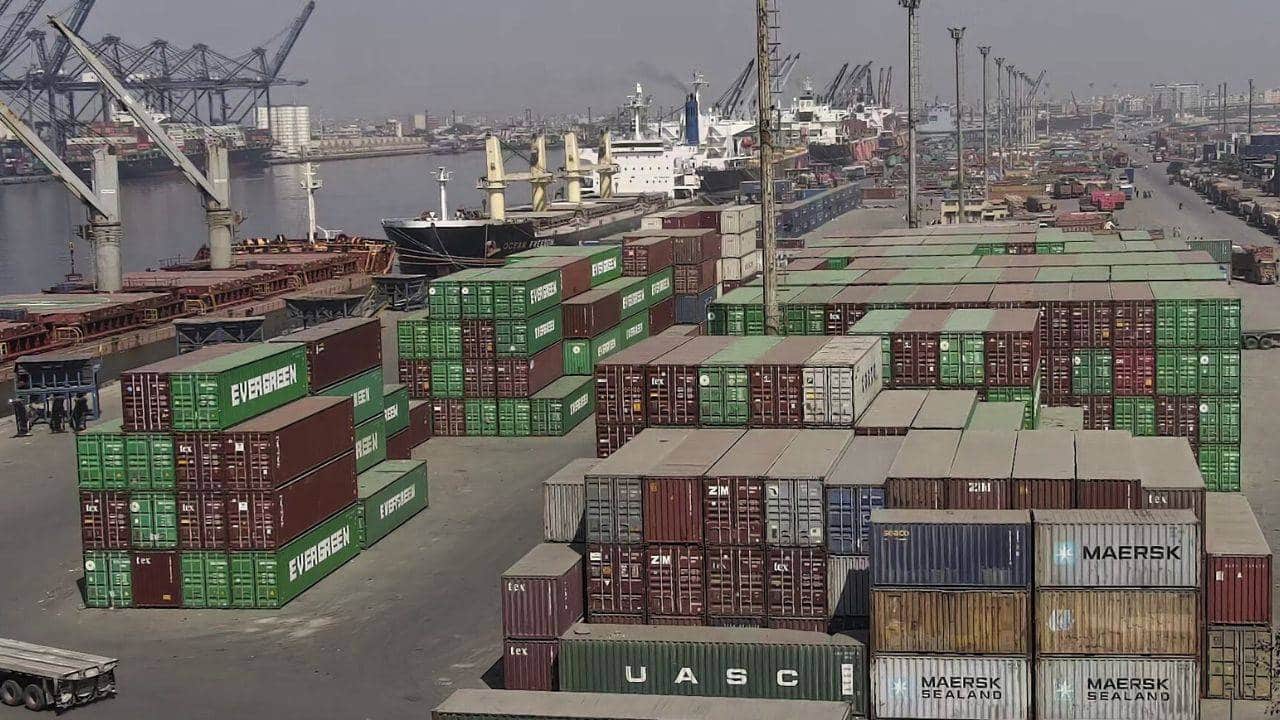In 2023, Pakistan signed major foreign investment agreements exceeding $3 billion. These investments aim to integrate its overland transit trade and maritime trade facilities at Karachi Port. These investments include the grant of multi-million-dollar concessions to AD Ports Group to operate and upgrade a container terminal, and a bulk and general cargo terminal on the East Wharf of Karachi Port. Also included is the investment from DP World to develop a dedicated Freight Corridor and Economic Zone near Karachi. Pakistan is further exploring development of integrated logistics and supply-chain network to support transit trade from the Central Asian Republics (CARs).
Pakistan is uniquely positioned to provide a global maritime gateway to the Central Asian Republics (CARs) including Kazakhstan, Kyrgyz Republic, Tajikistan, Turkmenistan, and Uzbekistan. The aggregate GDP of the Central Asian Republics is about $450 billion with a sizable chunk going to agricultural produce.
Historically, Central Asian Republics have majorly exported to the European Union and Turkey in the West and to Russia and China in the East. However, due to their landlocked status CARs have not been able to grow exports to South Asia, Gulf countries, Oceania, Africa, and the Americas. Integration of transit trade to Karachi Port opens doors to new markets.
Pakistan has signed multiple agreements to facilitate and bolster trade with the Central Asian Republics. The Transit Trade Agreement between Uzbekistan and Pakistan will move Uzbekistan’s entire trade from Iran’s Port Bandar Abbas to Pakistani seaports. To ease the transit-trade a Preferential Trade Agreement (PTA) was also signed in 2022 between Uzbekistan and Pakistan.
The PTA covers a list of goods with the aim of significantly lowering duties, minimizing non-tariff barriers, and friction-less procedural requirements. As a result of these measures the bilateral trade between Pakistan and Uzbekistan is estimated to grow to $1 billion.
Pakistan delivered its first trade consignment to Kazakhstan, under the Quadrilateral Traffic in Transit Agreement (QTTA), through the Khunjerab Pass in 2023. In 2021, the yearly trade volume between Pakistan and Kazakhstan had exceeded $200 million with the potential to reach $1 billion.
The QTTA is a transit trade deal that facilitates transit traffic and trade between China, Pakistan, Kyrgyzstan, and Kazakhstan. Tajikistan and Uzbekistan have expressed a desire to join the QTTA. Transit trade between Pakistan and the Central Asian Republics is already a ground reality.
The port concession grants come in the context of recent international investment contracts to develop economic activity zones at the Karachi Port and to integrate the rail and road network to the transit trade route all the way to the Central Asian Republics. Pakistan already has over 2000 kilometers of roads connecting Karachi Port along the Silk Route up to the Khunjerab Pass with China. Pakistan Railways has a carriage connection from Karachi Port integrated with nearly 8000 kilometers of railway network.
In 2023, Uzbekistan, Afghanistan, and Pakistan agreed to establish a tri-nation rail link aimed at facilitating regional, transit, and bilateral trade among the participating countries. The main objective of the tri-nation project is to construct a rail link, connecting Uzbekistan Railways with the Pakistan Railways via Afghanistan. The link will take the route from Termez to Mazar-e-Sharif, Logar and Kharlachi.
Karachi Port opens tremendous trade opportunity for the Central Asian Republics with South Asia, Gulf countries including Oman, United Arab Emirates, Qatar, Bahrain, Saudi Arabia, and Kuwait, and Africa. Major exports of the Central Asian Republics include agricultural produce especially cotton fiber, grains, and fruits and natural mineral resources like copper, gold, uranium, petroleum gas. These items have the potential to capture previously untapped markets in Africa, Oceania, and the Americas.
Karachi Port handles over 90% of Pakistan’s total trade including imports and exports. The Port handled a gross trade volume of 41.85 million tons Cargo and 1.93 million TEUs Containers through the financial year 2022-23. These numbers are bound to dramatically grow as Pakistan bolsters its transit trade from Karachi port to the Central Asian Republics. To meet the swell in transit trade, Pakistan is rapidly enhancing its seaports capacity with international partnerships.
Pakistan has a long history of granting berth concessions to global maritime trade players. Recently, the AD Ports Group made sizable investment deals in Pakistan’s maritime economy under concessions to operate a container terminal and a bulk and general cargo terminal on the Karachi Port. What’s unique this time is that these concessions have been granted under intergovernmental cooperation between the United Arab Emirates and Pakistan with a much larger and integrated economic activity design.
Global leaders in the maritime trade are realizing this opportunity and investing in Pakistani ports. AD Ports Group has become the latest international player to start operations across a container terminal and a bulk and general cargo terminal on the East Wharf of Karachi Port. AD Ports Group now operates at berths 6-17 along 2300 meters (approx.) long quay-wall. The Group’s joint venture subsidiary, Karachi Gateway Terminal Limited (KGTL) operates a container terminal at berths 6-10 across 800 meters under a 50-year concession.
KGTL has plans for expansion of container storage yard for increased handling capacity of more than 1 million TEUs per annum. KGTL also plans on undertaking dredging for deepening of berths at Karachi Port to achieve up to 15-meter draft that will pave the way to handle larger and deeper draft vessels.
Additionally, a second joint venture of AD Ports Group, Karachi Gateway Terminal Multipurpose Limited (KGTML) operates a bulk and general cargo terminal at berths 11-17 across 1500 meters under a 25-year concession that is extendable to a second tenure of 25 years. KGTML plans to expand the current handling capacity to 14 million tons per annum.
Karachi Port has historically focused on handling over 90% of Pakistan’s external trade. However, its installed capacity to handle more than 125 Million Tons cargo and 4.25 Million TEUs has remained largely under-utilized. Recent measures to attract investment in the upgradation of ports, economic activity zones, supply-chain network, and integrated logistics, signal a shift to capturing more of the regional maritime trade. The recent concession agreements allotted to AD Ports Group on the container terminal and bulk and general cargo terminal entail extensive development of the infrastructure and superstructure facilities.
Reportedly, AD Ports Group will invest $395 million in its joint ventures Karachi Gateway Terminal Private Limited (KGTL) and Karachi Gateway Terminal Multipurpose Private Limited (KGTML) to upgrade and expand their servicing capacities. AD Ports Group has revealed that it’s investment will include specialized ship-to-shore (STS) quay cranes, rubber-tyred gantries, conveyors, expansion of container storage and on-site warehousing capacity for bulk and cargo, and digitalized port operations to upgrade the efficiency markers for Karachi Port to compete regionally. These terminal capacity enhancements will be key in attracting deep-sea shipping lines to Karachi Port thus enabling Pakistan’s dream to join the league of transshipment hubs.
Pakistan is sending strong signals to the global transshipment market that it is gearing up to increase its share in the transshipment traffic. The recent investments by AD Ports Group in increasing port servicing capacity will directly add to transshipment volume at the Karachi Port.
AD Ports Group, through its global footprint of ports and economic activity zones will be a major pull for deep-sea shipping lines to see Pakistan as a preferred port of call. Further, as the trade volume picks up it will attract foreign direct investment to Pakistan in various maritime related businesses.
Pakistan seems to be headed in the right direction to dovetail transit trade with CARs with its ambitions to become a regional transshipment hub. Increase in the number of containers, bulk and general cargo from the CARs countries will bolster trade volume through the Karachi Port. This will add to the number of shipping lines calling at Karachi Port to serve new shipping lanes and adding new market destinations to serve the newly created market. Exciting times are ahead for the Pakistani economy.























Great get it shipped in Karachi and get customs in Lahore for cheaper! Thats what you called State Racism.